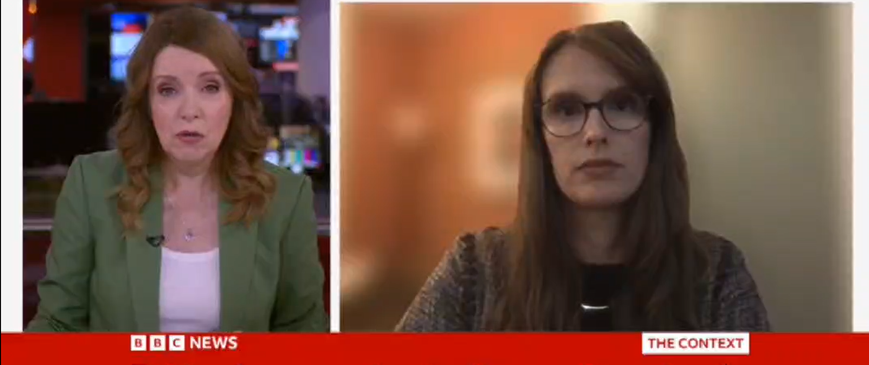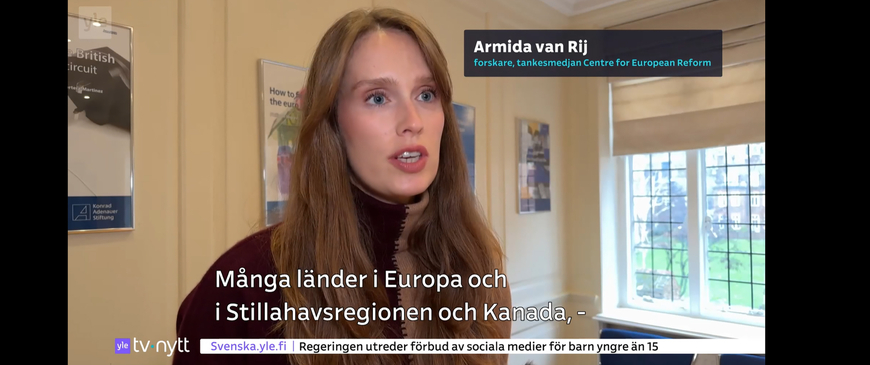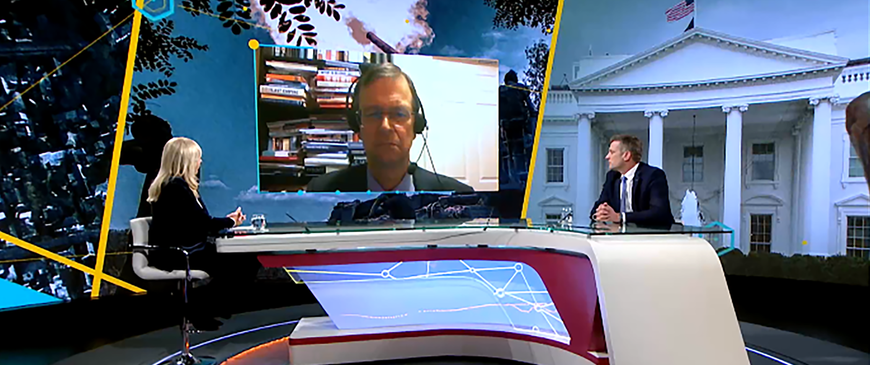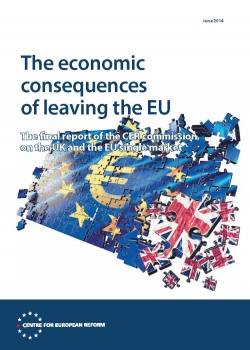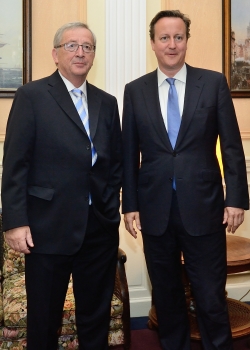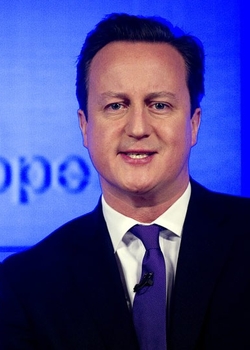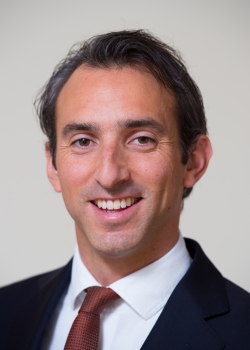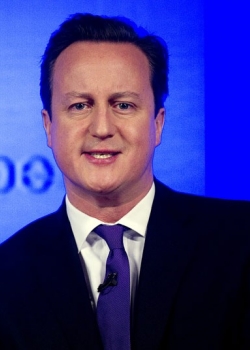Press
The interpreter
16 May 2015
The Economist
The prime minister appears to realise that he needs to work to improve his relationships with other European leaders. In the past he has been seen by his prospective partners as rather “transactional”, says Charles Grant of the CER.
Lo que Europa no quiere contar de la gestión de fronteras en África
15 May 2015
eldiario.es
"Las mafias de tráfico de inmigrantes no son homogéneas. No son tipos que estén esperando con un barco a que lleguen los inmigrantes, sino que están controladas desde Europa, por la información que tenemos", apunta Camino Mortera, investigadora sobre Justicia e Interior del Centro para la Reforma Europea, con base en Londres.
Brexit – what would happen if Britain left the EU?
14 May 2015
The Guardian
The CER, says that although the UK is a net contributor to the EU, after Brexit the country would face pressure to replace EU regional funding and agricultural subsidies with domestic spending. There would also be a dent to the public finances if immigration is cut upon exit, given migrants are large net contributors to the Treasury and rejuvenate Britain’s ageing population, according to a report by a CER commission last year.
How Cameron can win an EU referendum
13 May 2015
Eutopia
Now that Cameron has won Britain’s general election, he must fulfil his promise of negotiating reforms to the EU and then holding an in-or-out referendum before the end of 2017.
Greg Hands given key role as Cameron mulls early EU referendum
12 May 2015
EurActiv.com
Charles Grant, director of the CER, said an early referendum could increase the likelihood of an ‘in’ vote, explaining: “The longer it is delayed, the more the climate of uncertainty will afflict the British economy and potentially deter foreign investment."
“If the referendum happened at the end of 2017, some voters might vote against the EU only because they were fed up with Cameron,” Grant warned.
“If the referendum happened at the end of 2017, some voters might vote against the EU only because they were fed up with Cameron,” Grant warned.
Listen carefully to the British
12 May 2015
Flashlight Europe - Bertelsmann-Stiftung
Other than many have predicted the general election in the United Kingdom have not led to a hung parliament but the opposite: An absolute majority for David Cameron and his Tory party.
Facing vicious debt cycle, Greece sprints to apply fixes
12 May 2015
New York Times
“There’s this erroneous assumption that the standoff between Greece and the eurozone is the only thing holding back a robust recovery,” said Simon Tilford, deputy director of the Centre for European Reform. “Greece’s problems are more deep-seated than that.”
By the end of summer, Greece will probably need yet another international financial assistance package of €30 billion to €50 billion to get it through the next year and a half, economists said.
By the end of summer, Greece will probably need yet another international financial assistance package of €30 billion to €50 billion to get it through the next year and a half, economists said.
In post-election Britain, talk turns to European Union
12 May 2015
New York Times
“Economically, the European Union would lose its biggest champion of free trade and the single market (which is why some protectionists would welcome a Brexit),” Charles Grant, director of the Centre for European Reform, wrote on the center’s website.
And in security terms, without Britain, Mr Grant wrote, “the EU would find it harder to become any kind of power.”
And in security terms, without Britain, Mr Grant wrote, “the EU would find it harder to become any kind of power.”
Cameron could hold British EU membership vote in 2016
12 May 2015
Agence France Presse
"It is highly likely they want to have a short re-negotiation that would be ended by the end of 2015 and they want to have a referendum in 2016," John Springford, an expert at the Centre for European Reform in London, told AFP.
France 24: Road to EU renegotiation for re-elected British PM
11 May 2015
Ian Bond speaks to France 24 on how Cameron will seek to re-negotiate with the EU
EU erwartet harte Gespräche mit London
10 May 2015
Die Presse.com
"Camerons Mehrheit ist dünn, die Fraktion hat eine große Macht", sagt Christian Odendahl vom Centre for European Reform, London. Zudem fehlt ihm mit den bisher mitregierenden Liberaldemokraten ein Korrektiv. "Das könnte Cameron zu einer harten Verhandlungsposition zwingen."
Несподівана перемога Кемерона
08 May 2015
Den
Експерт про те, чого очікувати Україні від другого терміну лідера консерваторів (in Ukranian).
British election's other losers: Pollsters
08 May 2015
The New York Times
Rem Korteweg, a senior research fellow at the Centre for European Reform in London, said that British pollsters were going through a particularly bad period. "This isn’t the first time in 18 months when the polls got it wrong," he said. "This is starting to become a trend in this country."
So, Mr Cameron, how can we help? EU seeks to avert Brexit
08 May 2015
Reuters
Charles Grant, director of the Centre for European Reform in London, said Cameron could highlight the program of cutting bureaucracy and interference as well as plans to improve free trade inside the bloc that is already under way under Juncker.
Conservative right could limit Cameron's freedom to push reforms
08 May 2015
Europe online
Christian Odendahl, chief economist at the Centre for European Reform, a pro-EU think-tank, said Cameron could be more vulberable because he "cannot hide behind coalition politics any longer."
Cameron im Triumphzug zurück in die Downing Street
08 May 2015
SZ
„Das könnte Camerons Position verhärten“, sagt Christian Odendahl, Chefökonom der Londoner Denkfabrik Centre for European Research (CER).
Marknadsjubel efter valskrällen
08 May 2015
di.se
Christian Odendahl, chefsekonom på CER, tycker att det är lika bra att få folkomröstningen överstökad. ”Den leder till osäkerhet för näringslivet. 2017 är inget idealiskt år eftersom det är val i Tyskland och Frankrike då.” Tories bräckliga majoritet ger mer makt åt partiets EUskeptiker. ”David Cameron kan inte längre gömma sig bakom Liberaldemokraterna för att tämja dem.”
Katasztrófa lenne, ha a britek kilépnének az EU-ból
08 May 2015
Nol.hu
Most már száz százalék, hogy a brit kormány népszavazást rendez az EU-tagságról, és ez rendkívül kockázatos stratégia – mondta lapunknak Rem Korteweg, az (CER). A mostani felmérések szerint a britek 55 százaléka az EU-ban maradna, 45 százalék kilépne.
Radio Fribourg: Cameron's promised EU referendum
07 May 2015
Ian Bond talks to Radio Fribourg on the referendum over the UK and the EU promised by David Cameron (02:50).
Darum ist die Briten - Wahl für UNS so wichtig
07 May 2015
Bild
„Die britische Wahrnehmung ist, dass die EU von Deutschen und Franzosen zu ihren Gunsten und gegen unsere Interessen gelenkt wird”, sagt Charles Grant vom Londoner Centre for European Reform (CER).

